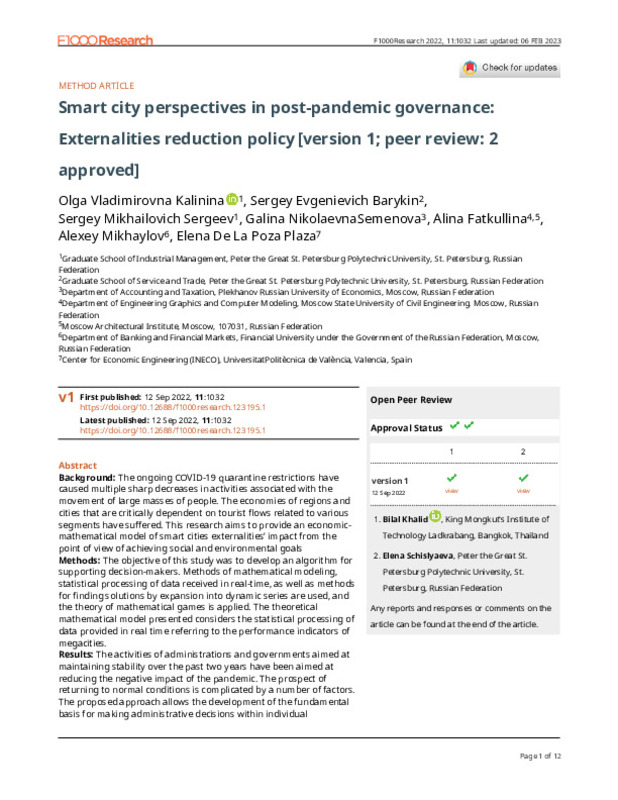JavaScript is disabled for your browser. Some features of this site may not work without it.
Buscar en RiuNet
Listar
Mi cuenta
Estadísticas
Ayuda RiuNet
Admin. UPV
Smart city perspectives in post-pandemic governance: Externalities reduction policy
Mostrar el registro sencillo del ítem
Ficheros en el ítem
| dc.contributor.author | De la Poza, Elena
|
es_ES |
| dc.contributor.author | Kalinina, Olga Vladimirovna
|
es_ES |
| dc.contributor.author | Barykin, Sergey Evgenievich
|
es_ES |
| dc.contributor.author | Sergeev, Sergey Mikhailovich
|
es_ES |
| dc.contributor.author | Semenova, Galina Nikolaevna
|
es_ES |
| dc.contributor.author | Fatkullina, Alina
|
es_ES |
| dc.contributor.author | Mikhaylov, Alexey
|
es_ES |
| dc.date.accessioned | 2023-11-21T19:02:11Z | |
| dc.date.available | 2023-11-21T19:02:11Z | |
| dc.date.issued | 2022-09-12 | es_ES |
| dc.identifier.uri | http://hdl.handle.net/10251/200058 | |
| dc.description.abstract | [EN] Background: The ongoing COVID-19 quarantine restrictions have caused multiple sharp decreases in activities associated with the movement of large masses of people. The economies of regions and cities that are critically dependent on tourist flows related to various segments have suffered. This research aims to provide an economic-mathematical model of smart cities externalities¿ impact from the point of view of achieving social and environmental goals Methods: The objective of this study was to develop an algorithm for supporting decision-makers. Methods of mathematical modeling, statistical processing of data received in real-time, as well as methods for finding solutions by expansion into dynamic series are used, and the theory of mathematical games is applied. The theoretical mathematical model presented considers the statistical processing of data provided in real time referring to the performance indicators of megacities. Results: The activities of administrations and governments aimed at maintaining stability over the past two years have been aimed at reducing the negative impact of the pandemic. The prospect of returning to normal conditions is complicated by a number of factors. The proposed approach allows the development of the fundamental basis for making administrative decisions within individual megapolises and in environmental policy on a territory of any scale. The developed mathematical model is abstract by definition and is applied by taking into account specific tasks and criteria. Since the tasks of the administration differ depending on the region and country, the choice of criteria is set individually. Conclusions: During the period of isolation, the volume of services in the Hotel - Restaurant- Catering/Café (HORECA) segment has decreased, and personnel has also been lost. The reduced pressure on public infrastructure and the departure of migrants means that, in the long term, this work cannot be restored within a short period of time. | es_ES |
| dc.description.sponsorship | The work was supported by the Ministry of Science and Higher Education of the Russian Federation under the strategic academic leadership program 'Priority 2030' (Agreement 075-15-2021-1333 dated 30 September 2021). The funders had no role in study design, data collection and analysis, decision to publish, or preparation of the manuscript | es_ES |
| dc.language | Inglés | es_ES |
| dc.publisher | F1000 Research, Ltd. | es_ES |
| dc.relation.ispartof | F1000Research | es_ES |
| dc.rights | Reserva de todos los derechos | es_ES |
| dc.subject | Digital Interactions | es_ES |
| dc.subject | Smart Cities | es_ES |
| dc.subject | Sustainable Development | es_ES |
| dc.subject | Digital Platforms | es_ES |
| dc.subject.classification | ECONOMIA FINANCIERA Y CONTABILIDAD | es_ES |
| dc.title | Smart city perspectives in post-pandemic governance: Externalities reduction policy | es_ES |
| dc.type | Artículo | es_ES |
| dc.identifier.doi | 10.12688/f1000research.123195.1 | es_ES |
| dc.relation.projectID | info:eu-repo/grantAgreement/EC/H2020/730283/EU | es_ES |
| dc.relation.projectID | info:eu-repo/grantAgreement/Ministry of Science and Higher Education of the Russian Federation//075-15-2021-1333//Priority 2030/ | es_ES |
| dc.rights.accessRights | Abierto | es_ES |
| dc.contributor.affiliation | Universitat Politècnica de València. Facultad de Administración y Dirección de Empresas - Facultat d'Administració i Direcció d'Empreses | es_ES |
| dc.description.bibliographicCitation | De La Poza, E.; Kalinina, OV.; Barykin, SE.; Sergeev, SM.; Semenova, GN.; Fatkullina, A.; Mikhaylov, A. (2022). Smart city perspectives in post-pandemic governance: Externalities reduction policy. F1000Research. 11(1032):1-12. https://doi.org/10.12688/f1000research.123195.1 | es_ES |
| dc.description.accrualMethod | S | es_ES |
| dc.relation.publisherversion | https://doi.org/10.12688/f1000research.123195.1 | es_ES |
| dc.description.upvformatpinicio | 1 | es_ES |
| dc.description.upvformatpfin | 12 | es_ES |
| dc.type.version | info:eu-repo/semantics/publishedVersion | es_ES |
| dc.description.volume | 11 | es_ES |
| dc.description.issue | 1032 | es_ES |
| dc.identifier.eissn | 2046-1402 | es_ES |
| dc.identifier.pmid | 36320630 | es_ES |
| dc.identifier.pmcid | PMC9593024 | es_ES |
| dc.relation.pasarela | S\482373 | es_ES |
| dc.contributor.funder | COMISION DE LAS COMUNIDADES EUROPEA | es_ES |
| dc.contributor.funder | Ministry of Science and Higher Education of the Russian Federation | es_ES |








